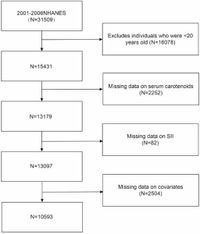A novel study has identified a significant negative correlation between serum carotenoid concentrations and the Systemic Immune-Inflammation Index (SII), offering new insights into dietary impacts on inflammation and health. Published on March 24, 2025, the research, which analyzed data from the National Health and Nutrition Examination Survey (NHANES) covering ages 20 and older, provides critical evidence supporting the potential health benefits of carotenoid consumption.
The SII, introduced in 2014, is a calculated index that serves as a reliable inflammatory biomarker, computed using the formula: platelet count multiplied by neutrophil count divided by lymphocyte count. Unlike traditional inflammatory indices, the SII reflects the balance between inflammation and immune response and has emerged as a prognostic marker for various diseases, including cancers and cardiovascular diseases. The recent study aimed to fill a notable gap in research evaluating how serum carotenoids—key dietary components known for their antioxidant and anti-inflammatory properties—correlate with the SII.
In total, 15,903 participants were examined, and the results indicated that those with higher concentrations of five specific serum carotenoids—trans-lycopene, β-carotene, α-carotene, lutein/zeaxanthin, and β-cryptoxanthin—exhibited lower SII values. According to the analysis, the highest quartiles of these carotenoids had a significant inverse relationship with SII, implying that increased carotenoid levels might help mitigate systemic inflammation.
The researchers employed sophisticated statistical methods, including multivariate linear regression analyses and threshold effect analysis, to evaluate their data. They discovered non-linear relationships between specific carotenoids and SII, particularly β-carotene and trans-lycopene, which displayed inflection points at specific concentrations. For β-carotene, the threshold was identified at 6.90 µg/dL (log2-transformed), while trans-lycopene showed a point of 4.01 µg/dL.
Notably, subgroup analyses presented variances that suggested factors such as age, race, and alcohol consumption moderating the effects of these carotenoids on SII. For instance, older participants or those currently consuming alcohol might experience different correlations between their carotenoid levels and systemic inflammation.
This research’s findings align with previous studies suggesting that a diet rich in fruits and vegetables, which are high in carotenoids, could play a preventive role against chronic diseases linked to inflammation. Regular intake of foods containing these compounds may reduce the risk of conditions such as heart disease, certain cancers, and neurodegenerative disorders.
According to the authors of the article, "The results showed the negative association between SII and the concentration of five different serum carotenoids." This statement reflects the significant implications these findings may have on dietary recommendations and public health strategies aimed at mitigating chronic inflammation across populations. Additionally, the authors noted that "The findings have potential public health implications and support the metabolic benefits of serum carotenoids on inflammation."
Despite the promising results, the study acknowledges some limitations, including that the cross-sectional nature of the data precludes establishing a definitive cause-and-effect relationship. Researchers caution that further longitudinal studies are necessary to fully understand the underlying mechanisms at play and to validate these associations over time.
The results underscore the importance of serum carotenoids in shaping inflammatory responses in the body and highlight the potential for these compounds as targets for therapeutic interventions. As systemic inflammation continues to contribute to numerous chronic health conditions, elucidating the role of diet, particularly serum carotenoids, in inflammation regulation may open new avenues for prevention and treatment strategies. In conclusion, this extensive analysis represents a foundational step towards understanding how dietary factors influence systemic inflammation and how they might help in managing chronic diseases prevalent in today’s society.

